News
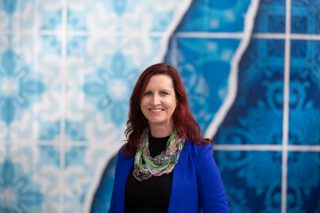
Using COVID lessons to unlock the digital world for people with disability
Curtin University Press Release, 7 March 2024, Samuel Jeremic
The COVID-19 pandemic resulted in many innovations in how we interact digitally — and a Curtin University research project has won significant funding to ensure people living with disability can also benefit from what’s been learned.
The Australian Research Council has awarded Professor Katie Ellis and her team more than $1 million as part of its Mid-Career Industry Fellowships Program, to investigate how digital services can be made more inclusive and accessible.
Director of Curtin’s Centre for Culture and Technology, Professor Ellis said the COVID-19 pandemic highlighted many shortcomings in how digital platforms cater to people with disability — which had many consequences.
“During the initial stages of the pandemic, there was no substantial effort to consult with people with disability or their representative organisations about their communication needs,” Professor Ellis said.
“This delayed the development of disability-specific policy and the dissemination of clear, consistent, and accessible information about the pandemic across relevant platforms: as a result, people with disability experienced increased risk of contracting the disease, severe disease or death and of new or worsening health conditions.
“As the pandemic progressed, innovative digital communication strategies were developed in Australia and internationally that could inform long-term digital inclusion for people with disability.”
In collaboration with the Centre for Inclusive Design, Professor Ellis said the research project aimed to improve the lives of the 20 per cent of Australians who identify as having a disability and meet Australia’s Disability Strategy 2021-31 priorities.
“Digitisation can be immensely beneficial: more than half of Australians with disability use assistive or mainstream digital technology to participate in everyday life,” she said.
“But it can also perpetuate the exclusions these people experience within society — be it social, health, employment, or educational settings — because we still do not fully understand their broad and individual needs.
“Our research team will work with people with disability to provide evidence-based recommendations to government, industry and community groups who create digital platforms to address these challenges.”
Curtin University Deputy Vice-Chancellor, Research Professor Melinda Fitzgerald congratulated Professor Ellis and her team on securing a highly sought-after ARC grant.
“This project is a great example of Curtin researchers striving to achieve real world impact through collaborative partnership,” Professor Fitzgerald said.
“Well done to Professor Ellis and all involved.”

Curtin research projects boosted by ARC Discovery funding
Ten Curtin University research projects aimed at solving some of the country’s biggest challenges have secured more than $4 million in federal government funding in the latest Discovery Project round from the Australian Research Council (ARC).
The projects include exploring the link between wellness and the housing crisis, mining DNA data to help in the conservation of endangered species, how business can better serve diverse customers and the creation of new science to enable the development of low-cost, miniaturised electrochemical sensors.
Curtin University Deputy Vice-Chancellor Research Professor Melinda Fitzgerald congratulated the successful researchers.
“The ARC Discovery Projects scheme aims to support national and international research collaborations and enhance the scale and focus of Australian research,” Professor Fitzgerald said.
“This support from the Federal Government allows the advancement of significant Curtin research projects that have the potential to create lasting scientific, economic, sustainability and social benefits.”
Summary of CCAT ARC funded research projects below:
Diversifying audio description in the Australian digital landscape (led by Professor Kathleen Ellis):
Audio description (AD) is a track of narration describing important visual elements of visual media to make it accessible to people who are blind or vision impaired. It is also increasingly being used by the mainstream audience. This project aims to examine the consumption and production of Audio Description throughout Australian cultural life. It expects to generate new knowledge about the ways digital media including emerging generative artificial intelligence might be leveraged to increase access to audio description. Expected outcomes include a curriculum, guidelines and materials designed to empower industries, communities and governments to work together to meet Australia’s obligation to provide access to cultural activities using AD.
Living Together: New approaches to multispecies conflict and coexistence (led by Associate Professor Robert Briggs):
Building on the methods and concepts of the emerging environmental humanities, this project will produce a new conceptual vocabulary for a world in which multispecies conflict and coexistence is increasingly important. It brings critical and generative re-readings of classical political thought and contemporary biopolitical and cosmopolitical approaches into dialogue with a set of empirical case studies emerging from novel encounters between humans and other animals. This project will expand Australia’s knowledge base and research capacity in the interdisciplinary environmental humanities and stake out new approaches to the question of living together in a changing environment.
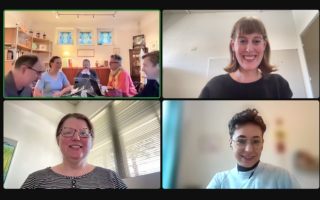
The COKI team is on the road
Professors Lucy Montgomery and Cameron Neylon from the Curtin Open Knowledge Initiative (COKI) met with project partners on the Mellon-funded Book Analytics Dashboard project in Lund, Sweden, on 24-25th October. Top of the agenda was project partners OAPEN reporting back on their successful trip to the Frankfurt Book Fair with a wide range of global scholarly publishers expressing interest in joining the pilot service which will help publishers and researchers track the impact and reach of their scholarly books.

Curtin artist wins international Gadim scholarship for practice-led research on disability representation.
Global media and disability alliance Gadim has awarded Curtin University visual artist Michael Miocevich with a sought-after scholarship to advance his disability representation works.
Presented in June 2023 by leading international media and disability scholar, Global Alliance for Disability in Media and Entertainment co-director and co-founder Professor Beth Haller, the scholarship will help disability-arts scholar Miocevich advance practice-led research on disability representation.
The Curtin Bachelor of Arts (Honours) student is an associate member of the Curtin Centre for Culture and Technology, CCAT, and part of the disability-and-the-media and fine-arts fields at the university. He shares his work online at @ozmikeart on Instagram.
CCAT director Professor Katie Ellis said Miocevich’s honours project highlighted the importance of disability inclusion in the arts.
“Miocevich and his research are a logical match for Gadim as the alliance also takes a critical perspective on disability representation and narratives of disability in the arts.”
As Miocevich explains: “So much of earlier art saw the use of aesthetics and idealised perfection in the human body to present ideals of beauty, divinity, strength, character and power. By contrast, works used to show evil, corruption, cruelty, greed and those who possessed a bad character as warped, deformed or malign, often incorporating physical disabilities as a method of portraying these themes.
As a student with disability, Michael’s work is informed by what some describe as lived experiences, in addition to historical research and experimentation with different creative methods.
Miocevich’s co-supervisor, CCAT research fellow and multidisciplinary disability scholar Dr Gwyneth Peaty said “the interplay between these elements is leading the project down a fascinating path and the scholarship will play an important role in supporting this journey.”
Miocevich said, “I use critical analysis of existing artworks made during many periods of fine art to help me create a body of work which incorporates or pushes back against the narratives which are being presented by the historical works.”
International organisation Gadim has its origins at the United Nations and is a not-for-profit alliance that advocates for greater visibility, representation, and accessibility in news and entertainment media. It was created by journalists Prof Haller and Brazil-based Patricia Almeida, and Australian lawyer and disability board director Catia Malaquias to promote the inclusion of people with disabilities in mass media worldwide.
Gadim’s mission is to advance the awareness-raising ambitions of article 8 of the United Nations Convention on the Rights of Persons with Disabilities (CRPD).
On 15 June, Miocevich gave a CCAT Adventures in Culture and Technology Seminar Series presentation on his work so far. It was followed by a question-and-answer discussion about art, media and disability with his supervisors, Dr Peaty and multidisciplinary artist Dr Kieron Broadhurst.
Gadim co-founder Prof Haller presented Miocevich with the scholarship at this event, which was also streamed online for an international audience.
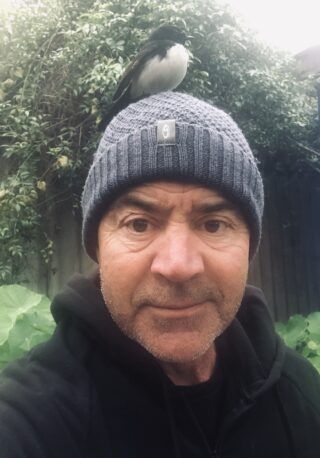
Meet CCAT Members
John Curtin Distinguished Professor Kim Scott is working toward socially just digital futures through his work as an ARC Future Fellow on the project ‘Narrative, Technologies and Wirlomin Moorditj-abiny’, which will explore how to develop a digital infrastructure in combination with a heritage of story, song and sites to strengthen a specific Noongar community identity. He also leads the Indigenous Culture and Digital Technologies CCAT program.
His most recent career highlight is being named as a State Cultural Treasure in 2022.

Meet CCAT members.
Introducing Dr Amy Shields Dobson convenes the Digital and Social Media teaching program and leads the Digital Intimacies CCAT program. They are working towards socially just digital futures through their work on anti-sexism and violence prevention in youth digital cultures.
Their career highlight is co-founding the Digital Intimacies conference, which has become a key annual event in this area.

On 2nd April the United Nations marked Autism Awareness Day.
The theme this year is Transformation: Toward a Neuro-Inclusive World for All.
World Autism Awareness Day – EN | United Nations
In recent years, major progress has been made in increasing awareness and acceptance of autism, not least thanks to the many amazing autistic advocates who have worked tirelessly to bring the lived experience of autistic people to the wider world. Additionally, medical professionals, researchers and academics in many countries are now incorporating the neurodiversity paradigm, coined by sociologist Judy Singer in the late 1990s, in their work. www.un.org
In the last two years, researchers in the Centre for Culture and Technology (CCAT) have teamed with Curtin’s Autism Research Group to bring together humanities and health approaches to neurodiversity research with a focus on the arts. Our exhibition in the John Curtin Gallery Sense and Sensitivity won the 2022 Curtin Research award for creative practice.
Sense and Sensitivity, Dawn-joy Leong and Simon Phillips. John Curtin Gallery 2021. The John Curtin Gallery presents the work of two neurodiverse artists, Perth-based landscape photographer, Simon Phillips, and Singapore-based performance ar…
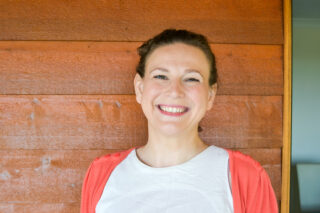
Meet CCAT members.
Introducing Professor Lucy Montgomery who leads CCAT’s Innovation in Knowledge Communication research program. She is working towards socially just digital futures through her work on open access to research. Her career highlight is writing an open access book with her dream team of collaborators: https://mitpress.mit.edu/9780262542432/open-knowledge-institutions/
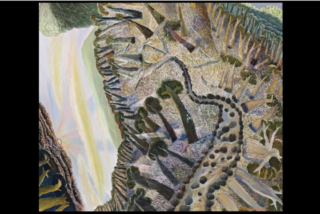
Two new books
Follow the links below for more information.
The volume Kin: Thinking with Deborah Bird Rose, edited by Thom van Dooren and CCAT’s Matthew Chrulew, was listed in the ABC article ‘The best books of 2022 for your summer reading list‘.
And
Matthew Chrulew’s experimental nature writing essay ‘The Shimmer of Flying Fox Landscape‘ was published in Island online in November 2022.
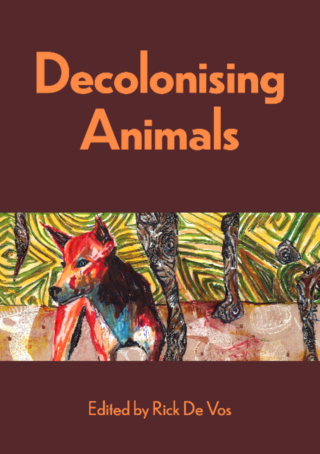
Decolonising Animals – new publication edited by Rick De Vos
The lives of non-human animals, their ways of being and seeing, their experiences and knowledge, and their relationships with each other, continue to be ignored, discounted, written over and destroyed by anthropocentric practices and endeavours. Within the vestiges of colonialism, this silence and occlusion co-opts and consumes animals, physically and culturally, into the servitude of human interests and selective narratives of history and progress. Decolonising Animals presents a set of animals whose relationships and responses to the conditions of their specific subjectivity disrupt and trouble colonial settlement narratives, processes and assumptions.
This collection brings together critical interrogations, case studies and creative explorations that identify and examine how non-human animals are affected by and respond to colonial structures and processes. Decolonising Animals includes the perspectives of Indigenous and non-Indigenous scholars, artists and activists, detailing the ways in which they question colonial ways of knowing, engaging with and representing animals. Importantly, the book offers suggestions for how we might decolonise our relationships with non-human animals – and with each other.
The book will be published on 1 April 2023.
Sydney University Press media release.
Data scientists turn a new page for open-access books
Media release
A Curtin University team of data scientists and software developers will help take open-access books to a sophisticated digital future through a pilot project that seeks to enhance the diversity of voices from small and medium book publishers across the globe.
The project has been awarded more than AUD$1 million by the prestigious Andrew W. Mellon Foundation, the largest supporter of the arts and humanities in the United States of America.
The project is being led by Professor Lucy Montgomery and Professor Cameron Neylon, from the Curtin Open Knowledge Initiative within the University’s Centre for Culture and Technology.
Professor Montgomery said the project sought to address a growing analytics capability gap that was placing the diversity of the scholarly book publishing system at risk.
The full media release, available online here, has been issued to local, national, education, arts and technology media.
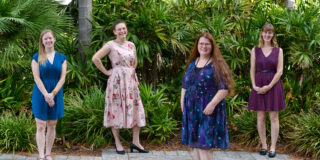
The Centre for Culture and Technology (CCAT) collaborating with the Curtin Institute of Computation: the Curtin Open Knowledge Initiative (COKI)
Research team
Curtin Institute for Computation: Rebecca Handcock, Srikanth Kompella, Rebecca Lange (2021), Rafiq Mohammed (2021), Kathryn Napier, Aniek Roelofs, Julian Tonti-Fillipini, Arun Veluchumy.
CCAT/MCASI: Karl Huang, Lucy Montgomery, Cameron Neylon, Alkim Ozaygen, Niamh Quigley, Katie Wilson.
External software developers: Tuan Chien, Jamie Diprose, and Richard Hosking.
Founded by Professors Lucy Montgomery and Cameron Neylon in 2017, the Curtin Open Knowledge Initiative (COKI) is an example of the power that Humanities research perspectives can bring to big data.
The goal of the COKI team is to be the world’s leading hub for analysis and evaluation of Open Knowledge in higher education.
Deep collaboration with the Curtin Institute for Computation is making this ambitious goal a reality.
COKI is the flagship initiative within the Centre for Culture and Technology’s ‘Innovation in Knowledge Communication’ research program. It is also a major CIC project, creating deep connections between the Faculty of Humanities and the Faculty of Science and Engineering.
The collaboration with the CIC has grown over time, with 2021 seeing the appointment of Dr Kathryn Napier as the COKI team’s Lead Data Scientist; as well as the expansion of the CIC-based technical and data science team and project management support.
This collaborative way of working across the Faculties of Humanities and Science and Engineering, in partnership with philanthropic funders including the Andrew W. Mellon Foundation and the Arcadia Fund has created a vibrant, deeply interdisciplinary research team.
Critical humanities scholars, data scientists and software developers, are all working together to develop insights, analysis and tools to support a shift towards Open Knowledge for universities and research funders around the world.
The COKI team are using big data and cloud computing approaches to combine open data sources on research activities and outputs at massive scale. COKI has built a data warehouse that makes it possible to explore open research practices across tens of thousands of research organisations.
COKI is collaborating with external stakeholders to develop visualisations and interactive dashboards that leverage this data. This has included creating dashboards to help the Big Ten Academic Alliance to explore publishing patterns and open access across its 14 member institutions.
COKI is also creating new tools to help the publishers of scholarly books to gain greater insights into the impacts of open access on the ways in which books are used and shared. These tools are already being used by scholarly publishers, including the University of Michigan Press (see Figure 1).
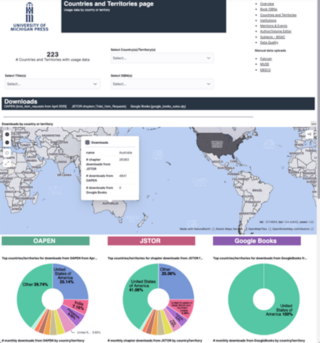
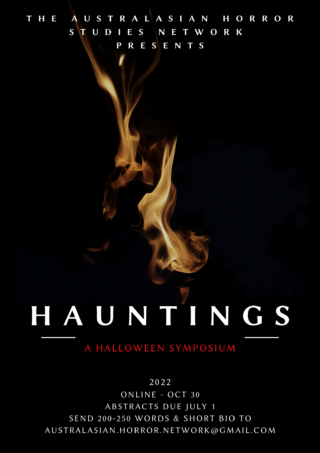
Call for Papers – Australasian Horror Studies Network (AHSN) Symposium
Free online via Zoom on 30 October 2022
The theme is ‘hauntings’ and presentations on all aspects of the theme are encouraged. For more information please visit the website https://australasianhorrorstudiesnetwork.wordpress.com/symposium/.
Submit your 200-250 word abstract, plus bio to australasian.horror.network@gmail.com.
‘Last year’s was a raging success and so fun 🙂’
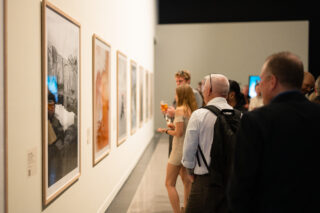
Sense and Sensitivity Exhibition
The exhibition combines the work of two neurodiverse artists, Perth-based landscape photographer, Simon Phillips, and Singapore-based performance artist, Dawn-joy Leong, in a series of sensory stories that celebrate the beauty of the natural and human worlds.
Sense and Sensitivity’s opening night was on the 16th of November and will be open until 15th of December. This exhibition is a result of a multi-disciplinary project that brought together health and humanities. The team included Katie Ellis, Suzanne Ingelbrecht, and Jordan Alice from MCASI, and Sonja Girdler and Emily D’Arcy from Curtin University Autism Research Group (CARG). The exhibition was launched by the Hon Don Punch MLA, Minister for Disability Services; Fisheries; Innovation and ICT; Seniors and Ageing, Member for Bunbury
There were many other people that helped along the way, including the John Curtin Gallery team and Curtin Events staff. The team is very proud of all the work that went into making this a stunning and accessible event.
More information can be found on the John Curtin Gallery website.
Netflix Global Casting Search
Seeking Australian or New Zealand resident for the role of
a teenage girl who is blind
ALL THE LIGHT WE CANNOT SEE
A new Netflix Limited Series based on the Pulitzer Prize-winning bestselling novel from 21 Laps Entertainment, the producers of Arrival, Stranger Things and Shadow & Bone.
SEEKING
Role of a teenage girl who is blind. Actresses who are blind or low vision are encouraged to apply. Must speak fluent English. Shooting slated for Europe 2022.
TO AUDITION
Please email submissions@mitchellcasting.com for more information on how to submit.
From Netflix and 21 Laps Entertainment: We are committed to inclusive, diverse casting. For every role, please submit qualified performers without regard to age, sex, ethnicity, disability, race, colour, national origin, sexual orientation, gender identity, or any other basis protected by law unless otherwise specifically indicated.
CCAT director Katie Ellis has contributed to Olympic and Paralympic Analysis 2020: Mega events, media, and the politics of sport.
The report consists of 114 articles from over 150 authors from all over the world, written days after the Olympics/ Paralympics.
The report can be found on https://olympicanalysis.org

Professor Katie Ellis (CCAT director) will be appearing in the SBS documentary What Does Australia Really Think About Disability on Wednesday 18 August at 8.30pm
View the promotional clip here.
More information about this series of documentaries can be found on the SBS Website.
14 new Indigenous-led research projects to share in $2.6 million in funding
The Outcomes of the Indigenous Research Exchange have been announced by The Minister for Indigenous Australians, the Hon Ken Wyatt AM, MP. CCAT director Professor Katie Ellis has partnered with the Centre for Inclusive Design on the project Breaking the Silence to conduct research into a culturally appropriate, co-designed Artificial Intelligence translation tool for Aboriginal visual (sign) language to English. This will support first contact and communication between mainstream justice/health systems and community.
Associate Professor Crystal Abidin gives evidence to UK Parliament
On Tuesday 13 July 2021, Associate Professor Crystal Abidin was invited to serve as a Witness to give evidence as a research expert before the UK government, for their Inquiry into Influencer culture by the cross-party Digital, Culture, Media and Sport Committee.
Background to the Inquiry is here: https://committees.parliament.uk/work/1126/influencer-culture/news/153483/dcms-committee-to-examine-the-power-of-influencers/
- Press release 1: https://committees.parliament.uk/work/1126/influencer-culture/news/153483/dcms-committee-to-examine-the-power-of-influencers/
- Press release 2: https://committees.parliament.uk/committee/378/digital-culture-media-and-sport-committee/news/156518/influencers-to-appear-before-mps-examining-impact-on-popular-culture/
- Recording of Inquiry: https://parliamentlive.tv/event/index/be81178f-138c-4cf3-a77f-4d91281570e8
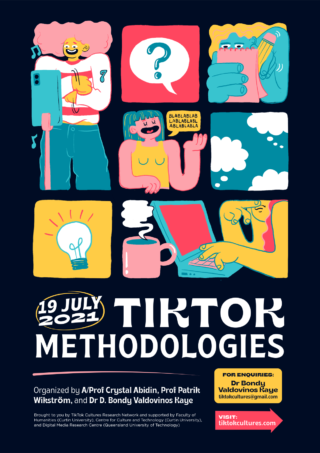
The TikTok Cultures Research Network is pleased to announce a virtual event TikTok Methodologies on 19 July 2021 organized by founding members Associate Professor Crystal Abidin, Professor Patrik Wikström, and Dr D. Bondy Valdovinos Kaye.
The field of digital media research is rapidly expanding to include innovative and exciting TikTok research. As one of the most widely used digital short video platforms around the world, TikTok is a key social arena to study global youth culture, creativity, professionalization, and activism. This event is a critical forum for discussion on TikTok research frameworks and methodologies from emerging voices in the field.
This two-hour virtual event will take place via Zoom on 19 July 2021 at 0900-1100 (GMT+8) and will feature two panel discussions with a diverse array of TikTok researchers.
We invite professionals from media industries and social media industries, students and researchers in academia, and members of the general public to attend this event.
The event is free but registration is required. Please register here on the Zoom website.
Please find a program for the event here. Recordings of both panels will be made available on tiktokcultures.com following the event.
Click to download the event poster in color and in B&W.
This event is brought to you by TikTok Cultures Research Network and supported by Faculty of Humanities (Curtin University), Centre for Culture and Technology (Curtin University), and Digital Media Research Centre (Queensland University of Technology).
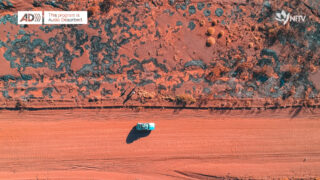
Audio description now available on SBS TV channels NITV and SBS World Movies
This April SBS is expanding it audio description service to two additional television channels—NITV, Australia’s TV channel made by, for and about Aboriginal and Torres Strait Islander people, and SBS World Movies. These channels join the SBS main channel and SBS VICELAND in providing audio described programs for blind or vision impaired audiences.
Audio description is an additional feature that describes the visual elements happening on screen during a television program such as the settings, backgrounds, costumes, and actions.
You can find out about how to switch on audio description on your TV on the SBS website at https://www.sbs.com.au/aboutus/audio-description-services. The website also includes a list of programs that will be broadcast with audio description, including the channel, time and date. To listen to a recording of upcoming audio described programming on SBS, phone Blind Citizens Australia toll free on 1800 033 660.
Programs with audio description on NITV this month include: The Djarn Djarns, a drama telling the story of a friendship between four young men and the responsibility they feel for their culture; and, documentaries such as Torres To The Thames (which follows the Purple Spider Dance troupe as they perform at a prestigious festival in England), as well as the SBS Original Documentary series First Australians (looking at issues including land rights).
On SBS World Movies, SBS’s channel dedicated to celebrating the diversity of world cinema, titles such as Hunt For The Wilderpeople, All Quiet On The Western Front and Apocalypse Now Redux will be shown with audio description in April.
The SBS audio description schedule is updated regularly so remember to keep checking the SBS website and the Blind Citizens Australia phoneline for new SBS program titles with audio description.
Programs on each channel with Audio Describing are in the program schedule.
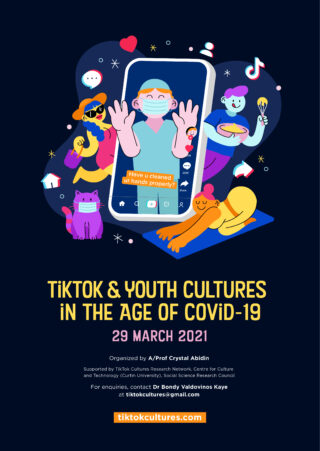
TikTok & Youth Cultures in the Age of COVID-19 event recordings
The TikTok Cultures Research Network held its second virtual event on TikTok and Youth Cultures in the Age of COVID-19 on 29 March 2021 hosted by founding members Associate Professor Crystal Abidin, Dr D Bondy Valdovinos Kaye, and Dr Andy Zhao.
TikTok has become one of the most widely used short video platforms around the world, with millions of new users joining during the COVID-19 lockdowns in 2020. The platform is now a key social arena for global youth culture, creativity, professionalization, and activism. This event is an open forum for discussions on how digital cultures are evolving in the wave of a global pandemic and the massive uptake of TikTok by diverse groups of people during this time.
This two-hour virtual event featured one research presentation and two panel discussions with a diverse array of panellists including TikTok influencers, media industry professionals, and academics.
Follow this link to the TikTok Cultures Research website for the full program and recording.

Failed Intimacies
29th April 2021, 10am-12pm – online
Part of the AHRC Postdigital Intimacies series. For more information on the network and to find the link to sign up to events, please see postdigitalintimacies.net.
Digital culture has regularly been understood as facilitating new intimate connections. But, there is a growing recognition that we should pay attention to moments where intimacy is repudiated, ruptures, breaks down, or appears to fail, or when intimacy produces nuanced feelings of hostility, anger or boredom.
In the first symposium, we draw attention to such failure. Our speakers’ highlight the way such failure is located in power structures, structured by gender, race and sexual identity. Their talks will explore new forms of extremism forged through the connective spread and contagion of online networks, as well as injury and repair.
Blackpilled: Incels, evolutionary psychology and the failed intimacies of neoliberal capitalism
Debbie Ging, Associate Professor of Media Studies in the School of Communications, Dublin City University, Ireland.
Incel culture is an online ‘community’ of predominantly – if not exclusively – heterosexual men who are sexually unsuccessful. This phenomenon has been facilitated both by social media and by the continued erosion of the social safety net under neoliberal capitalism. This has created emotional and political voids in which white male disaffection is being strategically animated and amplified by the more ideologically astute architects of the alt-right and the manosphere.
This paper locates key discourses which chart the successive failures of intimacy through which incels have evolved as a distinct ‘community’, from the social isolation that many non-conforming males experience, and the neolioberal management of neuroatypicality to the dysfunctional intimacies forged in the digital echo chambers of red pill and black pill ‘philosophy’. In addition to disillusionment with the shortcomings of seduction strategies (Bratich and Banet-Weiser, 2019), incel is deeply invested in the pseudoscience of evolutionary psychology. Despite its apparent longing for a return to the pre-modern, this interpretation of ‘evo-psych’ is paradoxically attuned to the neoliberal commodification of intimacy and of self. Concepts such as the sexual marketplace, sexual market value (SMV) and alpha fux/beta bux have distorted young men’s understandings of intimacy and sex as transactional, engendering rage not only against feminism but against all women who refuse to give them sex, as well as the alpha males (chads) to whom these women do provide sex. As Garcia-Favaro and Gill (2016) point out, if it can be demonstrated that men’s necessity for (hetero)sex and objectification of women is instinctual and uncontrollable, ‘In a powerful rhetorical move, feminists can thus be positioned as attacking the (bio) existential rights of men’.
Without economic status, the body becomes an even more important site of masculine signification. However, incels do not conform to idealised standards of male attractiveness, and are in this sense doubly emasculated. For those who still maintain hope in the possibility of sexual success, turning to steroids, body building (gymcels), invasive jaw surgery, mewing and other forms of physical self-improvement (looksmaxxing) is seen as a last resort. As with PUA, however, this promise of individual self-improvement fails, resulting in despair, a return to theories of evolutionary fatalism and, ultimately, collective rage against women.
In this last-stop psychic space of Blackpill (those incels who are resigned to their fate), intimacy is forged through ‘affectively charged personal narratives’ (Papacharissi, 2015) of despair, self-loathing and revenge. Displaying some striking similarities (as well as some significant differences) to pro-anorexia communities, blackpilled incels detach entirely from aspirations to sexual intimacy, turning their frustration and anxiety inwards, on their own bodily imperfections, and outward on sexually successful women and men (Chads and Stacies). In this sense, we can consider Blackpilled incels as simultaneously a dangerous political faction of the Manosphere as well as part of the human collateral damage wrought by technocapitalism.
Understanding online sexual harassment and image based sexual abuse: Changing the conceptual frames around youth digital sexual cultures
Jessica Ringrose, Professor of Sociology of Gender and Education at the University College London Institute of Education, UK.
Kaitlyn Regehr, Senior Lecturer in Media and Digital Culture at the University of Kent, UK.
This paper explores findings from a qualitative study with 150 young people (aged 11-21), which investigated youth experiences of sharing digitally networked sexual images. We examine young people’s encounters with online image sharing practices (conventionally referred to as sexting) as materialising through a continuum of consensual and non-consensual practices. We explore how image sharing takes place against a back drop of normalised technologically facilitated sexual violence in schooling and peer cultures, which legitimizes and perpetuates online sexual harassment, including cyberflashing and image based sexual abuse (IBSA). Taking an intersectional approach to consider diverse youth’s complex intersecting identities and the ways this shaped their experiences of online sexual harassment, we first outline the ubiquitous nature of non consensual sharing of nudes or IBSA, which we explore through a range of everyday examples. Then, we demonstrate how the risks of non consensual sharing of nudes are gendered, with the implications and effects far worse and long lasting for girls than boys. We explore a variety of experiences with diverse young people from range of different schools, including experiences of revenge porn, ‘expose’ and ‘bait out pages’ as discussed by both boys and girls. Finally, we look in some depth at an episode of IBSA where religious sexual double standards are operating in the peer group. Using an intersectional feminist lens, we analyse how the girls have internalised misogynistic victim blaming and shaming, which means they excuse the boy perpetrator of peer to peer IBSA, and ostracize the girl from their friend group. We also explore, however, how the discussion space allowed the group to start to trouble these logics of heteronormative femininity and religioned sexual purity. In conclusion, we argue that schools need to shift to the feminist conceptual framing of online sexual harassment which clearly outlines IBSA to better understand non-consensual digital sexual experiences. We argue the shift to these terms can better support young people in managing and negotiating digital gendered and sexualised harms and risks.
Reparatively reading postdigital publics
Amy Dobson, Lecturer in Digital and Social Media at Curtin University, Australia.
Participation in social media communication and self-representation has become near-imperative for many people, especially youth. This was so before global “lockdowns” began and is certainly more so now. There is increasing public awareness of, and concern about, the design features, app interfaces, and platform algorithms aimed at keeping platform users engaged and active for as long as possible. Yet, vernacular discourses about social media participation are still primarily framed in terms of human agency — the individual choices and responsibilities of users, especially young people, and along gendered, raced. For socially marginalised youth in particular, connection via social media is often framed in terms of promises of empowerment and self-expression, if not social capital and direct social mobility (Dobson, Carah, & Robards, 2018). Sociologist Eva Illouz suggests that late-modern societies are characterised by the prevalence of therapeutic discourses for understanding the self and subjectivity, and thus an ability to narrate the self “transparently” and to perform “authentically” is seen as key to personal happiness (Illouz, 2007), personal “empowerment”, and to one’s value.
Postdigital cultures chime nicely with such understandings of subjectivity. Unsurprisingly, the ability to represent a self “authentically” online is now seen as key to monestising social media (Abidin). In thinking about what is important in conceptualising intimacy in a “postdigital” world, I highlight the need to understand social media participation and self-representation beyond simplistic notions of human agency and choice; to conceptualise public-private sharing and “oversharing”, as well as limited self-disclosure and non-participation, as structured by existing social axes of inequality, as well as by non-human agents. I consider the kind of “reparative reading” (following Sedgwick, 2003; Wiegman, 2014) of everyday social media participation that might be ethically mandated in the current context, particularly of more “provocative” and contentious self-representations. In such intensely pressured, socially-striated and digitally collapsed contexts, constituted by a complex assemblage of human and non-human actants, an ethics of “queer comradery and generosity” is vital (Warner, 1999). In short, we need to practice love, not judgement, when trying to understand and analyse contentious youth digital representations and cultures.
Speaker Bios
Debbie Ging is Associate Professor of Media Studies in the School of Communications. Her research is concerned with gender and social media, focusing in particular on online misogyny, the manosphere, incels and the radicalization of young men into online male supremacy groups. Debbie is a co-author of the first government-commissioned report on the sexualisation and commercialisation of children in Ireland. Together with Prof. Eugenia Siapera, she has co-edited a special issue of Feminist Media Studies on Online Misogyny (2018) and an edited collection entitled Gender Hate Online: Understanding the New Anti-Feminism (Palgrave Macmillan, 2019). Debbie has also co-edited a special issue of the International Journal of Bullying Prevention on Gender, Sexuality and Bullying with Dr. Aoife Neary in University of Limerick. She is Ireland Corresponding Editor of the journal Men and Masculinities. She is a member of the National Anti-Bullying Research and Resource Centre and of the Institute for Future Media and Journalism (FuJo) in DCU.
Jessica Ringrose is Professor of Sociology of Gender and Education at the UCL Institute of Education and co-director of the Centre for Sociology of Education and Equity. Her research focuses on youth digital intimacies and sexual cultures, and innovative feminist qualitative, participatory and impactful research methodologies. Recent books include Feminist Posthumanisms, New Materialisms and Education (Routledge, 2018) and Digital Feminist Activism (Oxford University Press, 2019), and is the 2020 Recipient of the Distinguished Contributions to Gender Equity in Education Research Award (USA), which recognizes her commitment to advocacy work. She founded the Feminist Educational Engagement Lab (FEEL) and co-coordinates PhEmaterialism.
Kaitlyn Regehr is a Senior Lecturer in media and digital culture at the University of Kent. Her research interests include gender, diversity and digital culture, and involve high impact forms of dissemination through engagement with government bodies and the film and media industry. She is invested in entwining theory and practice, inclusive of documentary and video ethnography and has created content for the BBC and the Guardian. Her research uses film-based practices both in methodological design and in subsequent research outputs, and include: Mayor of London funded project “The Women We See: Experiences of Gender and Diversity in London’s Public Advertising” (with Professor Jessica Ringrose); Discovery Network funded documentary “Video Evidence: Sexual Violence, Trauma and Technology”; Kent University Impact funded , “Gender, Social Media and Image Based Sexual Abuse” (with Professor Jessica Ringrose); and, in collaboration with Scotland Yard, a study of the “Incel” community (which includes a documentary with BBC3 and an upcoming monograph).
Amy Shields Dobson is a Lecturer in Digital and Social Media at Curtin University. Her work focuses on youth, social media, and gendered subjectivities. She is the author of Postfeminist Digital Cultures (2015), and editor of Digital Intimate Publics and Social Media (2018) with Brady Robards & Nicholas Carah, both published by Palgrave. Over the last decade her work has advanced knowledge about youth social media use by highlighting the complexity of digital self-representation and the co-constitution of youth self-representational practices, and commercial digital media and platform imperatives. Her recent projects include research into cyber-safety and sexting education, female genital cosmetic surgery, and youth nightlife cultures and alcohol branding on social media.

Free online webinar – register now!
TikTok & Youth Cultures in the Age of COVID-19
29 March 2021 0900-1100hrs GMT+8.
Registration is essential via https://zoom.us/webinar/register/WN_I7V1n_lCSFWoqj6qifF9UQ.
Proudly presented by the TikTok Cultures Research Network, and supported by Social Science Research Council, Centre for Culture and Technology (CCAT) Curtin University, Australian Research Council.
Featuring:
- ‘How are young people messaging COVID-19 on TikTok’ by Crystal Abidin, Bondy Valdovinos-Kaye, Zhao Xinyu
- ‘How has COVID-19 impacted the landscape and culture of TikTok’ featuring Ariel Bogel (ASPI International Cyber Policy Centre), Kylie Sng (Hepmil Creators Network), Patrick Smith (TikToker thepaperpat), and moderated by Aleesha Rodriguez (QUT)
- ‘What is the future of TikTok for youth engagements’ featuring Tahlea Aualiitia (ABC Radio Australia), Oddie Randa (Gushcloud Marketing Group), Nich Richie (TikToker nichrichie), and moderated by Emily van der Nagel (Monash)
Follow this link to see the speakers and their affiliations.
The event will be recorded and archived on tiktokcultures.com for interested parties who are unable to attend.
The TikTok Cultures Research Network will also be formally opening our membership to interested scholars. See the ‘About’ page for Founding and Global Members. https://tiktokcultures.com/covid-19-event/

Research on COVID-19-necessitated online learning on CaLD Migrant and Refugee background students and university staff
We are seeking your assistance with helping to recruit participants for our study exploring the effects of COVID-19-necessitated online learning on Culturally and Linguistically Diverse Migrant and Refugee (CALDMR) background students and university staff.
Working as a collective under the Refugee Education Special Interest Group, this study has been funded by the National Centre for Student Equity in Higher Education (NCSEHE). We hope to use information from this research to benefit CALDMR students, as well as university educators, equity practitioners and educational designers.
Specifically, we want to hear about the experiences of:
• Student-facing professional university staff, with at least 12 months’ experience working for a university in an equity/ student support role;
• Academic teaching staff or senior university personnel with responsibility for teaching and learning, who are employed on a fixed-term or ongoing basis; and
• Educational developers involved in supporting teaching staff to move courses into remote delivery during 2020.
Participation in the study involves completing a short online survey, with the option to undertake a follow up interview.
All of the survey links can be found here: http://refugee-education.org/2020/10/seeking-participants-for-our-study-exploring-the-effects-of-covid-19
We are hoping to document the experiences and perceptions of a wide range of people from the above groups, so please can you disseminate this invitation to participate to the relevant people in your institution.
For further information, please email the Chief Investigator at sally.baker@unsw.edu.au
Thank you from the research team.
Dr Sally Baker (CI) (University of New South Wales)
Dr Lisa Hartley (Curtin University)
Dr Clemence Due (University of Adelaide)
Dr Rachel Burke (University of Newcastle)
Dr Joel Anderson (Australian Catholic University)
Associate Professor Loshini Naidoo (Western Sydney University)
Dr William Mude (Central Queensland University)
Carolina Morison (Macquarie University)
Dr Teresa De Fazio (Victoria University)
Associate Professor Ravinder Sidhu (University of Queensland)
Dr Tebeje Molla (Deakin University)
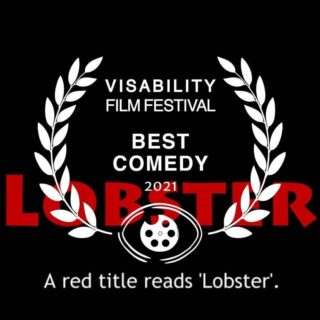
‘Lobster’, the audio described short movie, has won the ‘Best Comedy’ award in the 2021 Visability Film Festival, London!
Created by Alison Myers, Katie Ellis’ PhD student, with Katie as Executive Producer. The script has also received an Honourable Mention and is one of only four nominees for the Best Script award.
Alison Myers’ innovative comedy incorporates Audio Description as a central character, who then attempts to help ‘Cam’ navigate the nauseating world of her blinding hangover.
Alison is an Audio Description Manager, and worked with a team of blind and low vision performers to deliver a film that is guaranteed to make you laugh.
Tickets to experience this side-splitting romp at the Visibality Film Festival 2021 are available from Eventbrite.
Read more about the Visability Film Festival on their Facebook page.
Follow this link to view the movie on YouTube.
OK, so Cam’s hungover, lost, vomit-stained, dealing with a very rude visitor, and totally in the dark. On the other hand, er, claw, she has an advantage that many Aussies can only dream about …

Smartphones and equal access for people who are blind or have low vision
An Australian-first study between Curtin University and Vision Australia has found a significant rise in smartphone use in the blind and low vision community, with 79% of participants owning a smartphone, revealing an increase of 365% in five years. Yet while these statistics demonstrate that one level of access to smart technology is being achieved, a more complex picture of ‘layered accessibility’ also emerged in our results.
The findings of our survey of over 800 people who were blind or had low vision, along with insights from follow-up interviews with a sample of this group on how the emerging Covid-19 pandemic affected their smartphone use.
With an increased use of, and reliance on, mobile digital technology – especially in the current global context – a deeper understanding of digital inequality and accessibility is required.
The full written report can be accessed here and the audio version accessed here. The ACAT seminar presentation delivering the results can be viewed here.

Automatic Closed Captions and Immersive Learning in Higher Education
In 2019 Echo360 made research grants available to lecturers who wanted to explore the impact of Echo360 with their students.
Professors Mike Kent and Katie Ellis and Ms Kai-Ti Kao at Curtin University saw an opportunity to extend their research around captioned content when Echo360 released the Automated Speech Recognition software in 2018. Winners of a 2019 research grant, they surveyed distance learners who had been given access to the Echo360 transcripts. Professors Ellis and Kent wanted to answer the question about whether or not transcripts were now an expectation for students (based on the availability in their entertainment) and what level of accuracy was acceptable.
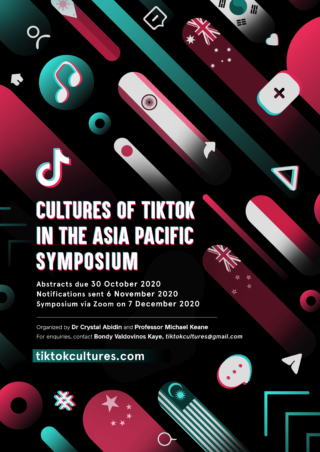
Call for Papers
Cultures of TikTok in the Asia Pacific Symposium (7 December 2020)
Dr Crystal Abidin, Prof Michael Keane, and the Centre for Culture and Technology (CCAT) at Curtin University invite submissions to a virtual symposium on Cultures of TikTok in the Asia Pacific. This event will be a critical forum for cutting edge research on TikTok, the globally influential short video platform that has captivated international attention and made headlines over the past two years. In particular, this event focuses on the cultures of TikTok (including but not limited to the platform, players, and politics) throughout the Asia Pacific Region. Contributions to this symposium will help pioneer research methodologies for studying TikTok and create further resources for curriculum development and future research.
This half-day virtual symposium will take place via Zoom on 7 December 2020 featuring presentations from contributors and a keynote delivered by Associate Professor Haiqing Yu (RMIT). Each contributing speaker will have approximately 15 minutes (10 minutes to present, 5 minutes for Q&A).
We invite submissions from researchers working in the Humanities and Social Sciences, including but not limited to in Internet Studies, Media Studies, Communication, Sociology, Anthropology, Theatre, Screen and Digital Media, Cultural Studies, and Journalism.
HDRs and ECRs (up to 5 years post-PhD + career interruptions) are strongly encouraged to apply.This will be an excellent opportunity for emerging researchers to receive supportive feedback from their peers.
Following the event, participants will be given publication mentoring opportunities through Dr Abidin and Prof Keane. A selection of papers will also be considered for inclusion in a Special Section tentatively entitled “Cultures of TikTok in the Asia Pacific” that will be published in a top ranked peer-reviewed journal in the field of Internet Studies or Media Studies.
Please submit abstracts (up to 250 words) for all potential talks and a short bio (up to 100 words) to bondykaye@gmail.com
Key Dates:
- 30 October 2020 – Abstract Submissions Due
- 6 November 2020 – Notifications of Acceptance
- 7 December 2020 – Symposium Date
We look forward to receiving your submissions! Please contact Dr Crystal Abidin (crystal.abidin@curtin.edu.au), Prof Michael Keane (m.keane@curtin.edu.au), or D. Bondy Valdovinos Kaye (bondykaye@gmail.com) with any questions about this event.
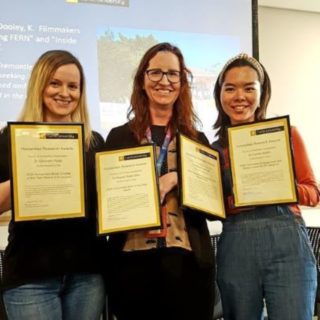
The 2020 Humanities Research Awards were presented on Friday 2nd October 2020
Congratulations to CCAT members
The event showcased and celebrated the breadth, quality and merit of the research in the Humanities Faculty. The Research Awards were presented for work published, shown or performed in 2019. Submissions for the Awards were competitive and showed the broad range of the Faculty’s research.
Congratulations to the Centre for Culture and Technology (CCAT) award winners below:
BOOK OF THE YEAR
Professor Katie Ellis
Ellis, K. 2019. “Disability and Digital Television Cultures Representation, Access, and Reception.” Routledge Research in Disability and Media Studies.
BOOK CHAPTER
Dr. Gwyneth Peaty (ECR category)
Peaty, G. The Afterlives of Alice: Reanimating the Gothic Heroine in Resident Evil in L. Piatti-Farnell (Ed.) Gothic Afterlives. Reincarnations of Horror in Film and Popular Media (15 pages). Lexington Books; Rowman & Littlefield.
MAJOR CREATIVE WORK
Professor Dawn Bennett
Bennett, D. Blom, D. Australia East and West: New music for viola and piano by Australian composers [CD]. Sydney: Wirripang Media (2019)
MINOR CREATIVE WORK
Dr. Stuart Bender
Bender, S.M. (2019). Genbaku Dome VR: Experience Hiroshima’s Atomic Legacy. Co-producer, co-director, VR Post-production. 7 minutes Immersive VR Experience.
ENGAGEMENT AND IMPACT
Professor Katie Ellis
For her research focusing on using digital media to create more accessible education and entertainment for people with disability involving substantive collaborations with and contributions to government, industry and community. Along with an impressive publication output and engagement with media, Katie’s research is making a significant impact on Australian society, especially through its contribution to the introduction of Audio Description on Australian free to air television, and input into the The Royal Commission into Violence, Abuse, Neglect and Exploitation of People with Disability regarding the ways media shapes attitudes towards people with disability.
Dr. Crystal Abidin (ECR)
For her research into social media influencers, which has a strong international presence and demonstrates incredible reach and influence, both in her field and in the broader social and media context, showing clear value well beyond the university.
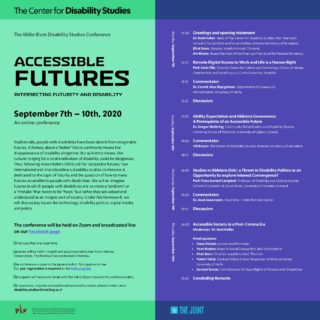
Attend The Millie Blum Disability Studies online conference – Katie Ellis presenting
Accessible Futures: Intersecting futurity and disability
7-10 September 2020
Traditionally, people with disabilities have been absent from imaginable futures. A fantasy about a “better” future commonly means the disappearance of disability altogether. But as history shows, this cultural longing for a total eradication of disability could be dangerous. Thus, following Alison Kafer’s (2013) call for “accessible futures,” our international and interdisciplinary disability studies conference is dedicated to the topic of futurity and the question of how to make futures accessible to people with disabilities. We will re-imagine futures in which people with disabilities are no more a “problem” or a “mistake” that needs to be “fixed,” but rather they are valued and understood as an integral part of society. Under this framework, we will discuss key issues like technology, disability politics, digital media, and policy.
The conference will be held on Zoom and broadcast live on our Facebook page
- Times specified are Israel time.
- Lectures will be held in English and accompanied by real-time Hebrew transcription.
- The Panel will be conducted in Hebrew.
- The conference is open to the general public. Participation is free, but pre-registration is required at the following link.
- Participants will receive an email with the link to Zoom towards the conference date.
- For questions, inquiries and additional accessibility needs, please contact us at: disability.studies@mail.huji.ac.il
Follow this link for the conference program.

The audio described, short movie ‘Lobster’ has been accepted in the 2021 Visability Film Festival, based in London!
The movie was created by Katie Ellis’ PhD student Alison Myers and Katie was the Executive Producer. The script also received an Honourable Mention and is one of only four nominees for the Best Script award.
OK, so Cam’s hungover, lost, vomit-stained, dealing with a very rude visitor, and totally in the dark. On the other hand, er, claw, she has an advantage that many Aussies can only dream about …

Automatic Speech Recognition from Echo360 – interview with Katie Ellis
August 2020
Echo360’s automatic speech recognition (ASR) transcriptions service – powered by AWS Transcribe – is renowned for its high level of accuracy and usability as well as its quick turnaround times. The ASR service translates the recording’s speech into text, giving student the ability to read, search and download the transcription. And the Transcript Editor which allow instructors and student to easily and conveniently edit the transcripts for improved accuracy. Echo360’s Alison Maloney sat down with three institutions that are using the transcription service to learn more about their experience.
Follow this link to the ASR website where you can read or listen to the interviews with Katie Ellis, Curtin University, Callan Rose, University of Western Australia and Genevieve Smith, Swinburne University.
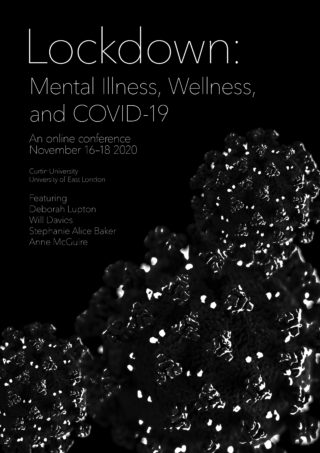
Call for Papers – Lockdown: Mental Illness, Wellness, and COVID-19
Free Conference, November 16-18, 2020
July 2020
In the wake of the global COVID-19 lockdown, digitally mediated and online forms of mental health therapy and wellness practices have proliferated. Such therapies and practices have been necessitated by the COVID-19 lockdown and its unique demands. Nevertheless, the necessity of social distancing has the potential to fuel calls for digitising treatment of mental illnesses, calls that emerge from institutions and entrepreneurs who see tele-therapies as cost effective, and as pushing a technocratic model of social-organisation, in line with the neoliberal discourse of ‘self-care’ in the service of ‘resilience’. Although there is much discussion of whether these technologies are effective or not, we argue it is important to ask beyond questions of efficacy and towards the implications of how these technologies will shape understandings of mental health and wellness.
The recently published report, “The Digital Future of Mental Healthcare and its Workforce” as part of the Topol Review on technology and healthcare in the UK, shows that there is a strong desire to increase the use of biometrics, social media meta-data analysis, virtual reality, chatbot therapists, and AI in the treatment of mental health.[1] Whereas in the past it was possible for sufferers of mental illnesses, madness advocacy groups, and critical practitioners to challenge the digitisation of mental health therapies, the dangers of COVID-19 have required almost all involved in the system to embrace digital technologies.
Given the uncertain temporality of the pandemic, how will digital technologies be exploited, harnessed, opposed, and embraced? How will they contribute to determinations of what counts as mental health in the context of new and evolving cultures of work and social life beyond COVID-19?
This free conference, which is a collaboration between Curtin University’s Centre for Culture and Technology and The University of East London’s Centre for Cultural Studies Research, will investigate these and related questions over a three-day online conference. As such, we are calling for papers, panels, and workshops related to:
· The politics of telehealth in a mental health context
· The mental health impact of COVID-19
· Critical approaches to digital mental health
· Emerging and shifting practices of digital intimacy, stress relief and care
· Exploration of the role of wellness/self-help influencers and microcelebrities
· The relationship between wellness technologies and the construction of gendered, racialised, sexualised and disabled bodies
· How a shift towards telehealth may also foster a push towards non-conventional forms of self-care and wellness practices.
Lockdown will feature the following speakers:
· Professor Deborah Lupton (UNSW), author of The Quantified Self (Polity 2016), Digital Sociology (Routledge 2014), and Medicine as Culture (Sage 2003) amongst many others
· Professor Will Davies (Goldsmiths), author of Nervous States (Vintage 2018), The Happiness Industry (Verso 2015), and The Limits of Neoliberalism (Sage 2014)
· Dr Stephanie Alice Baker (City University of London), with Chris Rojek the author of Lifestyle Gurus: Constructing Authority and Influence Online (Polity 2019) and Social Tragedy: The power of Myth, Ritual and Emotion in the New Media Ecology (Palgrave 2014)
· Associate Professor Anne McGuire (New College Toronto) author of War on Autism: On the Cultural Logic of Normative Violence (University of Michigan Press 2016)
Please note that we are receptive to alternative panel/paper formats. If you would like to present your work in a non-traditional format, please state so in your expression of interest.
All panels will be facilitated using Zoom. Please note, some days will favour UK times and others AUS times. See the below Google Form link for more information.
Abstracts for papers (500 words) should be sent via the following Google Form page: https://forms.gle/7UWvZKshQncbojsF7
There are no registration fees for this conference.
The deadline for proposals is September 13 2020
————————————————————————
[1] The report can be accessed via: https://topol.hee.nhs.uk/wp-content/uploads/HEE-Topol-Review-Mental-health-paper.pdf
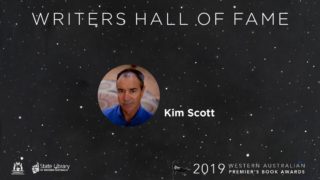
Congratulations to Kim Scott who has been inducted into the WA Writers Hall of Fame
Congratulations to Professor Kim Scott who was inducted into the WA Writers Hall of Fame on Friday, 7 August. WA Hall of Fame judge and CEO of Fremantle Press, Jane Fraser, said “his work is a shining example of how Western Australian stories, well told and beautifully crafted, can create opportunities to learn about our shared past. His books cross boundaries, reaching readers from all backgrounds both at home and overseas. A true artist and literary activist, whether he’s writing fiction, sharing oral histories or working on important Noongar language projects, his work is a gift to us all.” The announcement was made during the Premier’s Book Awards at the State Library and can
be viewed on YouTube.
The results of the Premier’s Book Awards, including prizes for Emerging Writer, Children’s Book Writer and the Fellowship, were announced at the same event. Rachel Robertson was Head Judge and Daniel Juckes (WCS sessional) was on the six-person judging panel of the Awards, a task involving reading many boxes of books and fellowship applications. It was wonderful to be at a (physically spaced) literary event once again, celebrating the work of WA authors.
Scholarships available now – CLOSED
1. RTP2021 Round 2 Animalities
For more information, follow this link.
2. RTP2021 Round 2 Posthumanist Environments
For more information, follow this link.
July 2020
Description/Applicant information
Over the last few decades, the status of ‘the human’ has been challenged on a number of fronts. Scientific knowledge of animal culture, mind and behaviour has questioned presumptions of human uniqueness. New media, robots and other technologies have transformed our sociality, producing new ways of living, dying and communicating with nonhuman others. Climate change and the Anthropocene thesis have brought to the fore our embeddedness in a wider environment subject to entangled processes of construction, destruction and extinction. And with these reconfigurations of the place of the human come questions about the capacity of traditional humanities scholarship to adequately account for these new dimensions to its object of study.
Aiming at understanding these challenges to the status both of the human and the humanities, the Posthumanities, Animalities, Environments research program is dedicated to identifying the constraints and the opportunities these cultural and intellectual developments broach. Working at the overlap of three fields of contemporary scholarly innovation — the posthumanities, the animalities, and the environmental humanities — the program seeks to develop transformative concepts and methods for humanities research in the Anthropocene.
Key problems tackled by this program include:
· understanding the role, status, potential and limits of human values and human agency in today’s changing world of new relationships, technologies, knowledge and risks.
· formulating and assessing new methodological practices appropriate to the changing human condition and to the changing demands of humanities research.
· identifying how to anticipate and respond to the challenges posed to contemporary political, social, economic and conceptual systems by an increasing recognition of human entanglement with nonhuman systems, forces and entities.
· determining the potential to compose new relations with various others—animals, machines, things, environments—and how to anticipate and evaluate the effects of these relations.
Applications are sought from candidates with Honours level undergraduate training in concepts and methods from cultural studies, critical theory, posthumanism, science and technology studies, animal studies, and/or the environmental humanities to engage in research one of the following areas:
RTP2021 Round 2 Animalities – for more information, follow this link.
RTP2021 Round 2 Posthumanist Environments – for more information, follow this link.

The International Encyclopedia of Gender, Media, and Communication
Recently published book with chapter, Non-Normative Characters: Disability, written by Prof. Katie Ellis https://onlinelibrary.wiley.com/doi/10.1002/9781119429128.iegmc172
July 2020
Abstract
Critical disability studies recognizes disability is culturally constructed as existing outside the bounds of normality. Rosemarie Garland‐Thomson identifies the way disabled bodies are constructed in culture as extraordinary or non‐normative. While disabled characters in film and television continue to be isolated, pathologized, and represented as being unable to be socialized and fully integrated into society socialized, new opportunities for representation are emerging via social media. Drawing on Garland‐Thomson’s framework of the stare and Stella Young’s critique of the media’s preference for inspirational narratives (so called inspiration porn) this entry highlights a number of examples of non‐normative characters evident in US, UK, and Australian media as they offer critiques of disabling society, contemporary beautyism, and the unattainable strive for the cultural ideal.
Targeted PhD Projects with Scholarship in Internet Studies at Curtin University
(to start 2021, applications close 1 September)
July 2020
Opportunities exist to apply for a range of targeted PhD scholarships located within the Internet Studies Discipline at Curtin University. The window of opportunity for these is short, so if you’re interested, please email the contact person listed in the specific project pages as soon as you’re able!
Please share these opportunities with current and recent Masters and Honours completions (and those completing this year).
The projects available:
- An Ethnography of Influencers and Social Justice Cultures https://scholarships.curtin.edu.au/Scholarship/?id=4270
- Analysing Virtual Influencers: Celebrity, Authenticity and Identity on Social Media https://scholarships.curtin.edu.au/Scholarship/?id=4324
- Climate Action and the Internet https://scholarships.curtin.edu.au/Scholarship/?id=4285
- Digital Disability and Disability Media https://scholarships.curtin.edu.au/Scholarship/?id=4318
- Digital Disability Inclusion across the Lifecourse https://scholarships.curtin.edu.au/Scholarship/?id=4291
- Digital intimacies and social media https://scholarships.curtin.edu.au/Scholarship/?id=4286
- Diversity, Equity and Impact: Exploring the Open Knowledge performance of Universities https://scholarships.curtin.edu.au/Scholarship/?id=4341
- Ethical and Sociocultural Impacts of AI/Autonomous Machines as Communicators https://scholarships.curtin.edu.au/Scholarship/?id=4360
- Tracking Australia’s Research Response to the COVID Pandemic https://scholarships.curtin.edu.au/Scholarship/?id=4347
- The Audio Internet https://scholarships.curtin.edu.au/Scholarship/?id=4322
To apply for these project opportunities applicants must submit an email to the contact Project lead listed on the project listing. The email must include their current curriculum vitae, a summary of their research skills and experience and the reason they are interested in this specific project.
The Project Lead will select one preferred applicant for this project and complete a Primary reference on their behalf.
After confirmation from the Project Lead that they will receive a primary reference for this project the applicant must submit an eApplication [https://study.curtin.edu.au/applying/research/#apply] for admission into the applicable HDR course no later than 1st September 2020.
All applicants must send an external referee template [https://scholarships.curtin.edu.au/wp-content/uploads/sites/8/2020/07/RTP2021-Round-2-External-Referee-Report.pdf] to their chosen external reference.
All references are confidential and must be submitted by the referee directly to HDRSCH-applications@curtin.edu.au no later than 1st September 2020.
Scholarship applications submitted without a primary reference or a completed application for admission will be considered incomplete.
For further information on the application process or for more RTP2021 Round 2 scholarship project opportunities visit: https://scholarships.curtin.edu.au/hdr-scholarships-funding/rtp-policy/
Apply now!

Recent publication
Disability, communication, and life itself in the COVID-19 pandemic
July 2020
ABSTRACT
In this article we offer an analysis of a deeply problematic and troubling dual aspect of the COVID-19 pandemic: how disability is being understood within normative accounts of health and medicine to frame, interpret, and respond to its spread and implications; what are the terms of inclusion and exclusion in altered social life in the COVID crisis; and how people with disabilities fare. We find disturbing indications of disablism and oppressive biopolitics in the ‘enforcing of normalcy’ that frames and dominates COVID reconstruction of social life – a situation that we suggest needs urgent deciphering, critique, and intervention.
To read the full publication please follow this link to the Taylor & Francis Online site.

Senate Select Committee on COVID-19: Acknowledgement of publication
Inquiry into the Australian Government’s response to the COVID-19 pandemic
June 2020
Congratulations to Professor Katie Ellis who recently received notification from the Senate Select Committee on COVID-19 advising that her submission has been published and it is available under Centre for Culture and Technology on the committee webpage at the following link: https://www.aph.gov.au/Parliamentary_Business/Committees/Senate/COVID-19/COVID19/Submissions.
Parliamentary privilege
As a committee document, and proceeding of Parliament, the version of your submission as it appears on the website is protected by parliamentary privilege. Parliamentary privilege refers to the special rights and immunities attached to the Parliament or its members (and witnesses) which are necessary for the discharge of parliamentary functions. Parliamentary privilege protects both Parliamentarians and witnesses before committees from civil or criminal action in a court or tribunal in respect of what they have said or done in the course of parliamentary proceedings and protects those proceedings themselves from challenge or question in a court or tribunal.
It is unlawful for anyone to threaten or disadvantage a witness on account of evidence given to a committee, and such action may be treated by the Senate as a contempt. It is also a contempt to give false or misleading evidence to a committee.
If you believe that anyone has disadvantaged you as a result of the submission you have made, please contact the committee secretariat.
Further information regarding parliamentary privilege is available from Senate Brief No. 11 – Parliamentary Privilege on the Australian Parliament website.
The committee is due to present a final report to the Senate on 30 June 2022. A copy of the report will be made public on the committee webpage.

Making Music Work
2020
We are delighted to report that the ARC Linkage project Making Music Work: Sustainable Careers for Australia Musicians is now complete.
We launched the project’s final industry report at an online event recently with musicians, industry professionals, academics, and partners from across Australia. If you would like to access a recording of the launch, please email: qcrc@griffith.edu.au
Making Music Work has mapped the creative, social, cultural, and economic realities of the portfolio music career in Australia, and drawn on insights from over 600 musicians to provide a nuanced and granular understanding of their working lives, career trajectories, creative aspirations, and economic circumstances.
While this research was completed prior to the COVID-19 global pandemic, its findings indicate why music has been among the first and hardest hit industries in the current health crisis, and could be among the slowest to recover. As such, our findings provide significant insights for musicians, as well as the music and broader arts sectors both now and into the post-COVID-19 recovery phase.
Our website has been updated with our suite of industry outputs, which are all free to download. This includes a 100+ page industry report, a summary brochure, a package of fact sheets from our survey findings, and a suite of musician profiles from our interviews. You can click on the thumbnails below to directly access these outputs. These will be hosted on our website and available for download for three years.
In addition to our outputs, you might be interested to read a story about our research in The Australian this week (featuring one of our participants Danielle Bentley) and a piece the team have written in The Conversation.
We will continue to publish on a range of themes stemming from our findings in the coming years, and will share these outputs with you via our Making Music Work social media channels. We encourage you to also consider how you might wish to build on the findings and recommendations of this project, and we would be happy to hear from you to discuss any ideas. You can contact the Research Team via the Queensland Conservatorium Research Centre, Griffith University at qcrc@griffith.edu.au
Warmest wishes,
Professors Brydie-Leigh Bartleet and Dawn Bennett
(on behalf of the Making Music Work team, Professors Brydie-Leigh Bartleet, Dawn Bennett, Ruth Bridgstock, Scott Harrison, Vanessa Tomlinson and Paul Draper, and Research Fellow Dr Christina Ballico).
Making Music Work is an initiative of Queensland Conservatorium Research Centre (QCRC), Griffith University, with industry partners, Australia Council for the Arts, Create NSW, Creative Victoria, Western Australian Government – Department of Local Government, Sport and Cultural Industries (DLGSC), and institutional partner Curtin University. The research team includes Professor Brydie-Leigh Bartleet, Professor Dawn Bennett, Professor Ruth Bridgstock, Professor Scott Harrison, Professor Vanessa Tomlinson, Professor Paul Draper, and Research Fellow Dr Christina Ballico. It was supported by the Australian Research Council as a Linkage project.
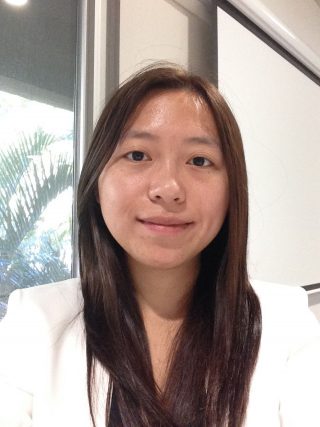
PhD Graduate Dr He Zhang and Dr Qian Gong poster receives ICA Conference Division Award
2020
Previously scheduled to take place in the beautiful Gold Coast, this year’s 70th International Communication Association (ICA) Annual Conference made history by going entirely virtual amid the COVID-19 pandemic. MCASI PhD graduate Dr He Zhang and Dr Qian Gong of the School of Education, who both have been active members of CCAT, had their paper titled “Reskilling” through Self-representation in a Digital Storytelling Project for Chinese International Students in Australia accepted by the Language and Social Interaction Division and received the Division’s Top Poster Award. As a response to Duke University administrator’s email warning Chinese international students not to speak Chinese in common areas, the paper discusses the potentiality of the participatory and creative practice of Digital Storytelling for constituting an alternative English experience for Chinese international students in Australian higher education. Using data collected in a series of Digital Storytelling workshops Dr He Zhang held in Perth for her PhD study, it took ideological and linguistic views of English uses in intercultural communication. According to its findings, Digital Storytelling enables an English “reskilling” process in which EAL students may rediscover their English abilities and hence reaffirmed the advantage of cross-cultural experience for study abroad. Practically, it proved a feasible choice of language pedagogy in educational institutions.
Follow this link to view the poster and listen to the presentation.
Seeking survey participants: Supporting students with disabilities to succeed in and after higher education
2020
NCSEHE (National Centre for Student Equity in Higher Education) Equity Fellow Tim Pitman is currently seeking survey respondents for his 2020 project on supporting students with disabilities to succeed in and after higher education.
Overview
This project is being conducted by Tim Pitman (Curtin University) and is funded by a grant from the NCSEHE.
Tim is investigating how Australian universities can best support students with disabilities, during their studies and beyond.
He would like to know what barriers students with disability face, both at university and when getting the work they want after graduation.
Tim wants to hear from students with disability as well as staff working in higher education institutions, regardless of whether or not their job role involves supporting students with disability.
Students completing the student survey will be eligible for entry into a prize draw. There will be ten winners, each receiving a $100 Amazon gift voucher.
Follow this link to the NCSEHE website to do the survey.
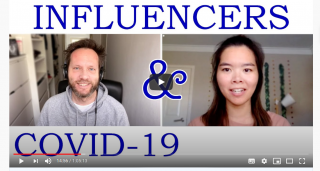
Influencers & COVID-19
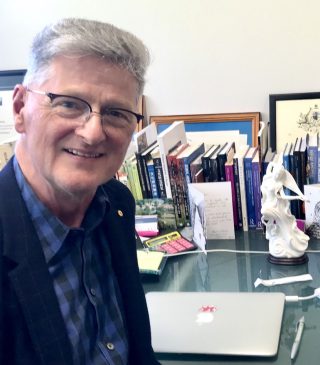
Congratulations!
2020
Bloomsbury Academic have offered a contract for a new book, On the Digital Semiosphere: Juri Lotman Meets the Anthropocene, by John Hartley, Indrek Ibrus and Maarja Ojamaa. This is the third volume in a ‘cultural science’ series, following Cultural Science: A Natural History of Stories, Demes, Knowledge and Innovation (John Hartley and Jason Potts, 2014); and How We Use Stories and Why That Matters: Cultural Science in Action (John Hartley, 2020). The latest volume is complete and ready for production, so should be published later in 2020.
These are three substantial monographs, working through the intellectual/analytical issues. It seems that there never was a better time to theorise the digital semiosphere than now, when humans must at last confront the realities of ‘one planet, one species’.
Here’s the good bit: Bloomsbury Collections is free and open for general access. Both of the already-published books are available on this platform gratis: Cultural Science; How We Use Stories.
Discovery Project funding awarded
2020
In collaboration with Nigel Rothfels (University of Wisconsin Milwaukee) and Nelly Mäekivi (University of Tartu), Matthew Chrulew (WCS, CCAT) has been awarded $201,786 in the latest round of Discovery Project funding for the project “Rethinking Zoo Biology: The Histories, Effects and Futures of Captivity”. The three-year project aims to transform our understanding of the captive management of wild animals using interdisciplinary approaches to the intersection of human and animal lives
